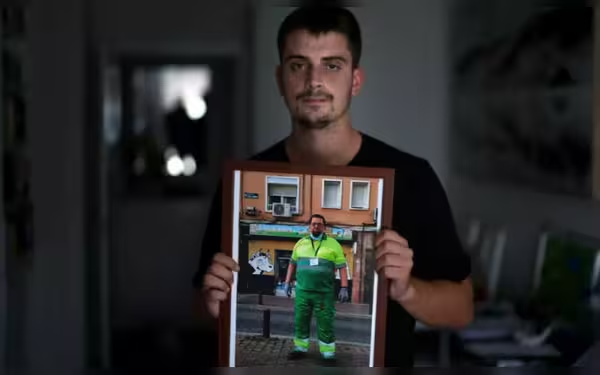Saturday, November 16, 2024 07:40 PM
Tragic Death of Madrid Street Sweeper Due to Heatwave
- Jose Antonio Gonzalez died from heatstroke in Madrid.
- Extreme heat poses risks for outdoor workers.
- Madrid implements measures to protect workers during heatwaves.
 Image Credits: brecorder
Image Credits: brecorderJose Antonio Gonzalez, a street sweeper in Madrid, tragically died from heatstroke, highlighting the dangers of extreme heat for outdoor workers.
In recent years, heatwaves have become a pressing concern across the globe, with rising temperatures posing significant risks to public health. The tragic case of Jose Antonio Gonzalez, a street sweeper in Madrid, serves as a stark reminder of the dangers associated with extreme heat, particularly for outdoor workers. On a scorching summer afternoon in July 2022, when temperatures soared above 40 degrees Celsius (104 Fahrenheit), Gonzalez fainted from heatstroke while on duty. This incident not only highlights the immediate dangers of heat exposure but also raises awareness about the broader implications of climate change.
Gonzalez, a 60-year-old man, had recently started a one-month contract as a street sweeper. Typically, he worked during the cooler morning hours, but on that fateful day, he swapped shifts to help a colleague. Starting work at 2 PM, he faced the highest temperatures of the day. Despite bringing two two-litre bottles of water and a spray bottle to cool off, it was not enough to prevent the heat from taking its toll. His son, Miguel Angel, recounted the harrowing details of that day, emphasizing the importance of hydration in extreme conditions.
When emergency services arrived at the scene, they found Gonzalez's body temperature had reached a critical 41.6 degrees Celsius. Despite their efforts to cool him down and provide immediate medical care, his organs were already failing by the time his family reached the hospital. The doctors delivered the devastating news that there was “no hope” for recovery. Gonzalez's death certificate later confirmed that he suffered fatal organ failure due to high body temperatures, underscoring the lethal consequences of heatstroke.
Experts explain that when body temperature exceeds 40 degrees Celsius, the body's natural defense mechanisms, such as sweating, become ineffective. The body struggles to regulate its temperature, leading to a dangerous situation where internal organs begin to fail. Intensive care doctors emphasize that heatstroke is a medical emergency, and quick intervention is crucial to prevent irreversible damage. Unfortunately, in some cases, even with prompt treatment, the damage may be too severe to reverse.
The impact of Gonzalez's death reverberated throughout Spain, prompting public discussions about the safety of outdoor workers during heatwaves. In response, Madrid city officials implemented measures to halt outdoor work during extreme heat and to avoid scheduling tasks during the hottest parts of the day. This shift in policy reflects a growing recognition of the need to protect vulnerable workers from the dangers of climate change.
As we face an uncertain future with climate change likely to exacerbate heatwaves, it is essential to prioritize the health and safety of outdoor workers. The story of Jose Antonio Gonzalez serves as a poignant reminder of the human cost of rising temperatures. It is crucial for employers, policymakers, and communities to work together to create safer working conditions and to raise awareness about the risks associated with extreme heat. By taking proactive measures, we can help prevent further tragedies and protect those who work tirelessly in the heat.













